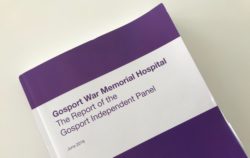by Professor Gary Ford CBE, FMedSci, Chief Executive, Oxford AHSN
The publication last month of the Gosport Independent Panel Report raises questions about how commissioners, providers and regulators ensure high quality safe care is provided to older people in community hospitals. Gosport War Memorial Hospital, whilst highly regarded by the local MP and many members of the local community, had unsafe clinical practices that over a period of ten years shortened the lives of at least 450 people admitted for rehabilitation.
The report describes practices that took place 20 years ago, and it is unlikely opiate and sedative drugs are being used in high doses without clear indication in other community hospitals today. However the report describes problems that are still present in some clinical and managerial teams that act as a barrier to high quality safe care in some NHS organisations.
I was first involved in the Gosport case as an expert witness in 2001 and expressed my concerns to the Commission for Health Improvement, the NHS regulatory organisation at that time. It is saddening and dispiriting that it has taken a further 17 years for a clear understanding of what happened at Gosport to emerge. I have suggested five key learning points for NHS clinicians, organisations and regulators:
 Empower frontline NHS staff to speak out and listen to them
Empower frontline NHS staff to speak out and listen to them- Investigate the system not the individual
- Analyse and compare deaths and prescribing across community hospitals
- Hold senior NHS management teams to account
- Listen and respond to patients.
As intermediate care services develop to provide care in the community, in or closer to patients’ homes, we need to do more to support shared learning and spread best practice across health and social care professionals working in community hospital teams. Community hospital services are at greater risk of isolation and poor supervision, and may be less visible to senior management teams than services in larger acute or mental health hospitals. Mortality reporting arrangements differ depending on the nature of the NHS organisation they belong to.
A 2017 report by RAND on community hospitals in England observed there were over 200 hospitals with in-patient beds that provide a wide range of services, had closer staff-patient relationships and offered a diversity of services that responded to the needs of local populations. Challenges were identified in attracting suitable staff due to the often rural location and poor infrastructure support such as IT systems. The report concluded that community hospitals needed to be better integrated into the rest of the healthcare system to offer an effective and efficient alternative to acute hospitals.
The Oxford AHSN Patient Safety Collaborative (PSC) is committed to raising standards in community-based care through shared learning. We have established a best practice network for healthcare professionals working with care home residents who have dementia and our award-winning care home hydration initiative. The Oxford AHSN region has 16 community hospitals. We will examine what support we can provide to health and social care teams working in these hospitals through our PSC, as well as identifying digital and diagnostic innovations to strengthen both local capability and integration with other NHS services. We welcome ideas and support from health and social care professionals who are interested in meeting this challenge.


